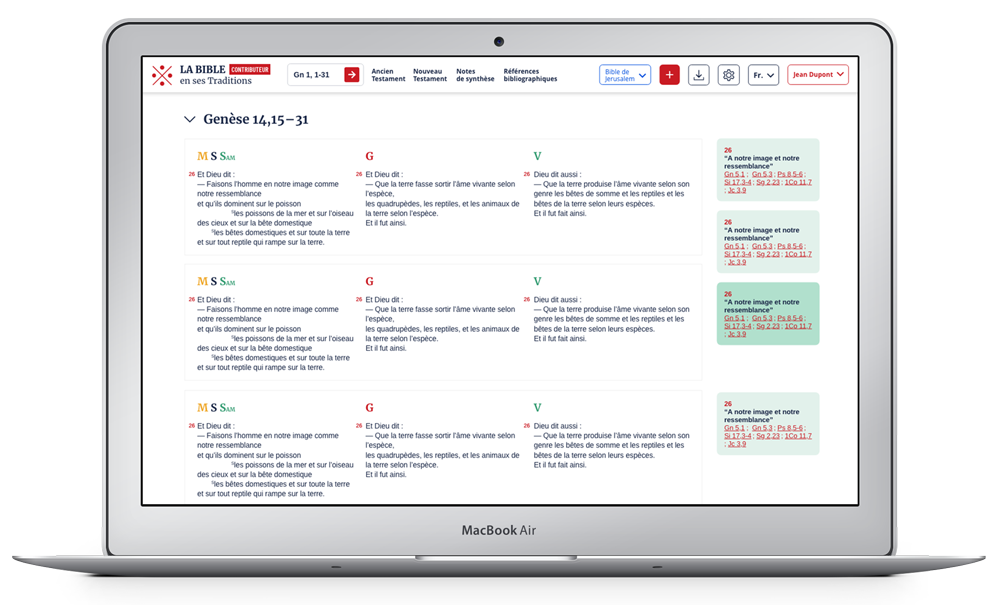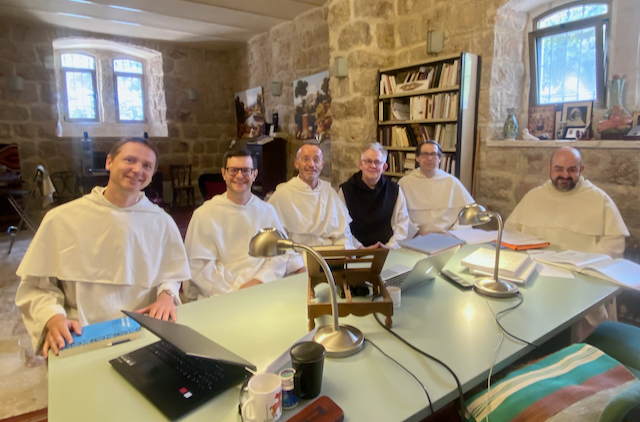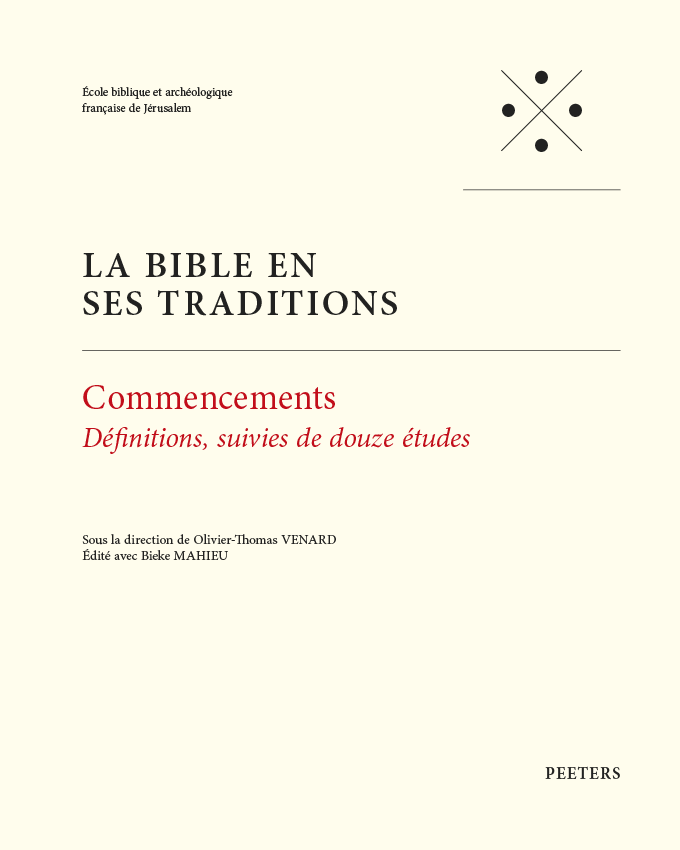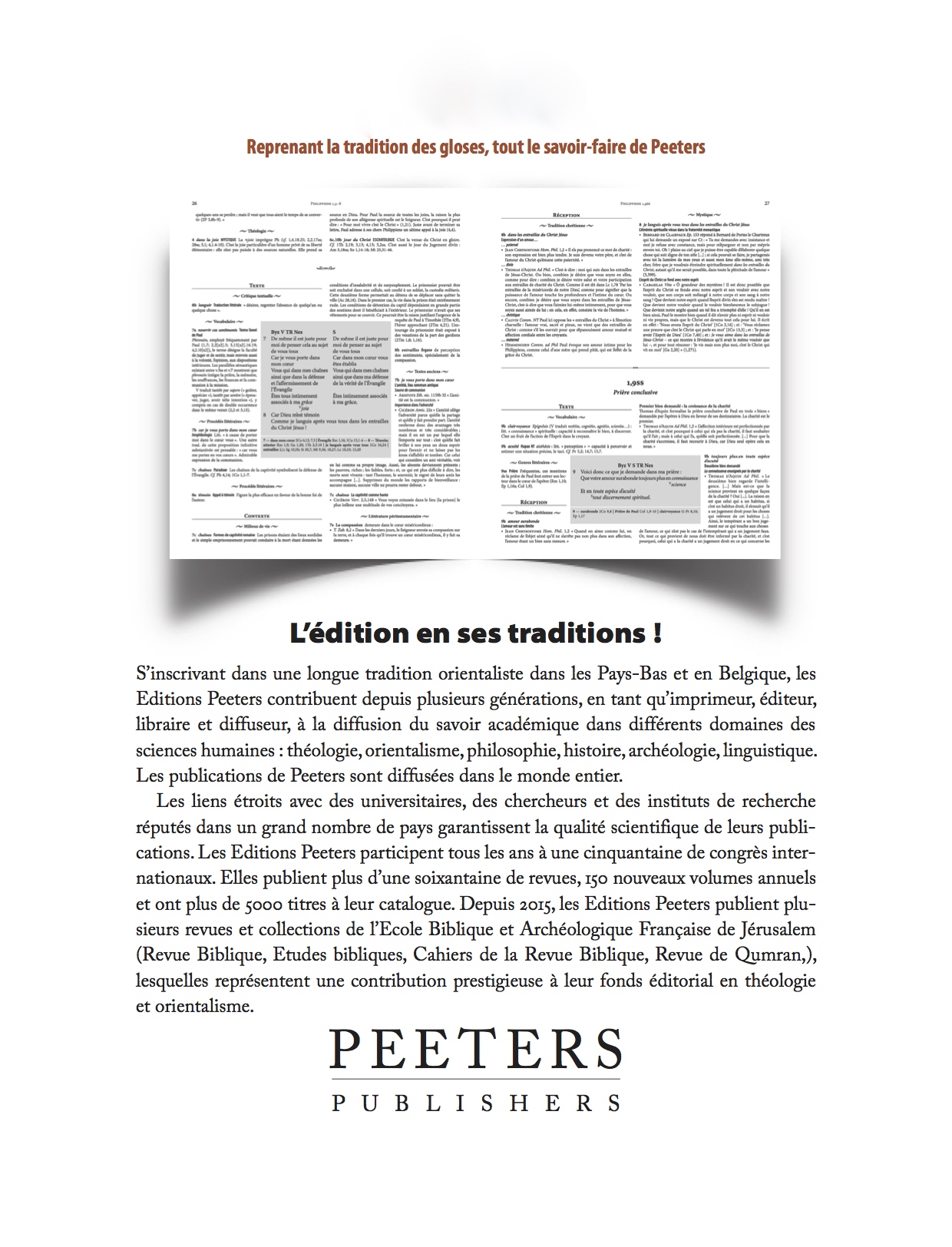The collaborative platform

The context
Serving research and teaching, this collaborative Internet platform is the fruit of more than a century of experience in the study, commentary and editing of the Scriptures at the French École biblique et archéologique of Jerusalem, as evidenced in the mid-20th century by the Jerusalem Bible. Here, since 2010, the School has been working on a new annotated bible that incorporates the knowledge accumulated by scholars in recent decades and the Copernican revolution it has brought. Far from the superficial opposition between Scripture and Tradition, we now know that the biblical text itself is always already a tradition.
In our era of the “fourth industrial revolution”, The Bible in its Traditions continues a very long history on the internet. The transmission of the Bible has always been interactive, from the antique papyri to today’s databases, passing through the great uncial codices, the medieval glosses or the reborn polyglots: the Scripture “grows with its reader”, said Saint Gregory the Great in the 7th century.
—> more details on the genesis of our project

The goal
is to is to create, for the cultivated general audience, a database as analytical as possible, in the form of notes attached to the biblical text.
- A new translation presents the versions that bring the text up to our time (Hebrew, Greek, Latin, Syriac).
- The notes present the context as well as the influence of the sacred text in the whole culture, both religious and secular.
Means
In constantly improving, our platform brings together researchers on the Bible in laboratories open book by book. Once approved by the École Biblique, each researcher intervenes according to his or her competence.
- Biblical scholars establish, translate and annotate the texts themselves and situate them in their original contexts
- Other researchers create notes in one or other of the twenty-six annotation headings, each according to his or her field (Jewish studies, patrology, ancient history, archaeology, liturgy, theology, philosophy, classical and modern literature, art history…


Invitation
Dedicated to research, the platform is open to
- all scholars who wish to collaborate directly in the construction of this biblical cathedral,
- young researchers, in particular doctoral students, who can work analytically and keep the fruits of their research in the form of notes along the biblical text;
- teachers who wish to make pedagogical use of it: courses, seminar support…
From proposing one note in your field of expertise, to taking in charge the edition of a full book, you are most welcome.
Please contact: info@bibletraditions.org
bibleinitstraditions@ebaf.edu
People involved
Legally established as an “international non-profit association” under Belgian law and controlled by the Order of Preachers (Dominicans), our research program allows developers and numerous scholars of at least 25 nationalities to collaborate in real time. The Bible in its Traditions has a clear Catholic inspiration because it unites Scripture and Tradition, far from fundamentalism and historicism. Scholars of other persuasions —Protestants, Orthodox, Jews, and even Muslims or non-believers— are invited to participate: our project is addressed to the community of all seekers of Truth.
Results
DIGITAL PUBLICATIONS
The proposals made available to the public (on the Scroll and on Bibleart) are periodically updated with the work in progress of our collaborators.
PRINTED PUBLICATIONS
Bible books
Directed by the editorial committee of La Bible en ses Traditions, a prestigious collection published by Peeters [link to the collection page], presents the biblical texts themselves, according to their principal versions, in original translations, framed by a rich annotation in the form of a Glossa (the text in the center, the notes that relate to it around).
Monographs
The colloquia that we organize or the individual works of certain collaborators are published by various publishers who are partners in the program.
ARTISTIC CREATION
The promoters of The Bible in its Traditions live in Jerusalem, a city where nothing remains “in the book”, where everything that is written ends up being accomplished, for better or for worse. So the Bible in its traditions has a creative dimension. The virtuosos of digital development make it a cultural moment in itself; contemporary artists and composers join the scholars, so that the immense adventure of the divine Word at the risk of human words continues!
“— Our Sagrada Familia”: the current director of the French Biblical and Archaeological School in Jerusalem likes to describe the work in progress by referring to Gaudi’s masterpiece, which is still in progress in Barcelona. In fact, it is to the construction of a cathedral that we invite you, as an academician Goncourt well understood:
“Gütenberg has turned the Bible into a book. With the ‘Best’ Project [The Bible in its traditions], it becomes a vision again. Who would have thought that, thanks to sophisticated technologies, its dematerialization would reinstate its original vocation? It will exist as never before through its transmission, the text and its reception once again in osmosis. Watching them all working on their great work, giving themselves thirty years for its completion while knowing that it will be, by definition, forever unfinished, one is overcome by a feeling of another age, as if the builders of cathedrals had just resurrected in front of us, behind their computers, and that they were building something greater than themselves for the sole glory of God.
(Pierre Assouline, Vies de Job, roman, NRF Paris : Gallimard, 2011, 195).
The Editorial Committee
Olivier-Thomas Venard, Łukasz Popko, Marc Leroy, Olivier Catel, Jorge Vargas Corvacho, Augustin Tavardon.

